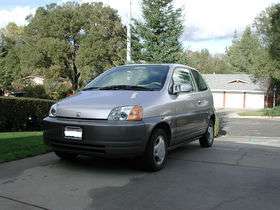Honda EV Plus
| Honda EV Plus | |
|---|---|
 | |
| Overview | |
| Manufacturer | Honda |
| Production |
1997-1999 about 300 produced |
| Body and chassis | |
| Class | Battery electric vehicle |
| Dimensions | |
| Wheelbase | 99.6 in (2.53 m) |
| Length | 159.3 in (4.05 m) |
| Width | 68.9 in (1.75 m) |
| Height | 64.2 in (1.63 m) |
| Curb weight | 1630 kg (3590 lb) |
| Chronology | |
| Successor | Honda Insight |
The Honda EV Plus was the first battery electric vehicle from a major automaker with non-lead acid batteries. Roughly 340 EV Plus models were produced and released. The EV Plus was taken out of production in 1999 when Honda announced the release of its first hybrid electric vehicle, the Honda Insight. The EV Plus was made to learn about advanced battery use in an electric car and to meet California Air Resources Board requirements for zero-emission vehicles, the same as the new General Motors EV1. It served as a test bed for the pancake-style motor, electronic control unit, power control unit and the Nickel–metal hydride battery (NiMH) later used in Honda hybrids and developed further in the first Honda FCX Fuel Cell Vehicles made from returned (decommissioned) EV Plus chassis.
The EV Plus featured on-board conductive charging with the Avcon connector, passive battery balancing, regenerative braking and deceleration, AC/heat-pump climate control, HID headlights, 4 seats, and electrically heated windshield. Units deployed in cold climates also had oil-fired heaters for faster cabin heating and passenger comfort. As with virtually all vehicles, range was affected by driving style: rapid acceleration, high speeds, and fast stops lowered the all-electric range significantly. United States Environmental Protection Agency rated at 81 miles (130 km), careful driving would give it a range of just over 100 miles (160 km). The EV Plus came with a 12 V battery for running normal 12 volt accessories and lighting.
Specifications
- Track Front/Rear: 59.1 in/58.7 in (1.50 m/1.49 m)
- Drive Train: Front-wheel drive
- Occupants: Four
- Voltage: 288 V
- Motor: DC Brushless
- Power: 49 kW (66 hp)
- Transmission: Single Speed with Reverse
- Battery (12 V X 24 = 288 V) NiMH
- Charger: On-board Conductive
- Recharge: 8 hours with 220 V charger, 35 hours with 110 V emergency charger.
- Acceleration: 4.9 s (0-30 mph)
- Maximum Speed: 80+ mph (130 km/h)
- Range: 100 miles or 160 km (80% discharge) under ideal conditions. EPA Rated to 81 miles (130 km) range (UDDS).
- Lease Cost: $455/mo for 36 mo. (including comprehensive collision, all maintenance and roadside assistance)
- Colors: dark green, bronze, silver
The EV Plus was listed with an MSRP of $53,900, but Honda never allowed them to be sold, instead offering the cars on a 3-year, lease-only program for $455.00 mo. Honda allowed some customers to extend their EV Plus lease for a few years. At the end of the leases, all EV Plus cars were taken back by Honda as decommissioned and eventually recycled (unlike the GM EV1, that was crushed and chopped up into tiny unrecognizable pieces). A few Honda EV Plus chassis were used as the base for some of Honda's first hydrogen (H2) fuel cell vehicle prototypes. Then those prototypes were also recycled.
- Honda EV Plus
 3/4 Front View
3/4 Front View Side View
Side View 3/4 Rear View
3/4 Rear View Name Decal
Name Decal Avcon Charging Port & UL Label
Avcon Charging Port & UL Label Avcon Charging Port Close-Up
Avcon Charging Port Close-Up UL Label
UL Label Electric Motor Compartment
Electric Motor Compartment Warning Label On Motor Controller
Warning Label On Motor Controller FCC Label on Motor Controller
FCC Label on Motor Controller Instrument Panel
Instrument Panel Instrument Panel Close-Up
Instrument Panel Close-Up
Vehicles also featured:
- CD player
- Power windows
- Power door locks
- Remote key fob controlled Air conditioning
- Electrically heated windshield
External links
| Wikimedia Commons has media related to Honda EV Plus. |